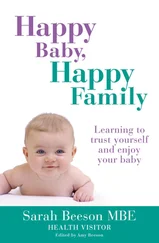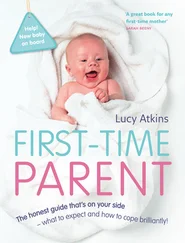Jane, mother of Thomas, Esther and Isaac knows what works for her:
‘It was important for us to have an evening so we wanted the baby upstairs on his own, in his own space. Simon felt very stressed having the baby around him and I was very worried that I’d spoil the baby by not having a routine. I was happy for a little baby to lead me, but there came a time when I needed some time and I needed to instil some routine. So, from ten weeks once he had his bath in the evening, he didn’t come downstairs. It was bath, feed, bed. It felt like we were back to normal.’
Others know that they want to make a decision with their baby:
‘My itinerary is totally unaffected by Alistair’s need to sleep. He sleeps anywhere and everywhere as soon as he’s tired, and at night he sleeps with me in my bed. Even strongly disapproving grandparents have to admit that he is a charming, pleasant, well mannered and very independent little boy. Child-led parenting isn’t a panacea, but it works well for a significant number of families. Too often “experts” seem to be trying to persuade us that our babies are tyrants needing strict regimes and hard-hearted discipline.’
Monica
What all these families have in common is a sense of certainty. The parents believe in what they are doing, and in their baby’s ability to fit in with it. It seems that babies who feel a sense of their parents’ certainty sleep well.
Every time a new baby is born he brings with him an infinite range of possible relationships. For both of you it is a time of enormous change, and some of the changes may seem awkward and not ‘you’. But by listening to your baby as well as to your inner voice, it is possible to smooth out most conflicts and to become confident of your ability to deal with any problems.
Take some time to get to know your baby and yourself. Do whatever feels right – gaze into your baby’s eyes, massage his tiny body (more about this in Chapter 8), sing songs, tickle, talk about life, the washing up and the cat, but especially listen and respond to what your baby has to say. Once you and your baby know each other well he can feel how much you love him, and he will be quicker to respond to you. And you can relax, because you know that, whatever happens, he can cope and that you will be there to support him while he does.
‘I really don’t think I was in tune with Laura as a baby. I don’t remember knowing when she wanted feeding, when she wanted sleep. I think I relied on mum more for interpreting her cries. It got worse as I got more fatigued. I had a honeymoon period between three and five months, but then I got postnatal depression.’
Sally, mother of Laura and Annie
If you feel ambivalent about your baby’s sleeping patterns it may be because you haven’t acknowledged what your own needs are.
‘It would be funny if I wasn’t so tired. The other day I was watching him through closed eyes so he couldn’t see that I was awake. He was sitting in bed in between us and just playing and then he looked around and realized that we were both asleep, or so he thought, and he reached over and hit Mike on the back. Mike turned over and mumbled something to him and then fell back asleep. So, Jonathan turned towards me and whacked me until I “woke up”. I thought “Who’s running the show here?” I don’t know. I’d like to have our bed back but Jonathan really seems to need to be with us.’
Sarah, mother of Jonathan, aged seven months
Sometimes practical problems cloud the issue further:
‘I tried to put her in her cot but she didn’t sleep for long. I just didn’t leave her for long. I couldn’t get a routine because I had the other children, and sometimes I was doing different things. She ended up being in our bed and I think I wanted her there. I kept giving her targets. I said: “By the time I get to six weeks she’ll be on her own.” So I felt under pressure a lot of the time. I felt I was letting Pete down. He’s not pushy at all, but every so often he jokes about it.’
Kim, mother of Camlo, five, Evie, two, and Eden, nine months
And sometimes the way we live our lives stops us doing what we want even when we are sure what is for the best.
‘When Bernard was seven weeks old my step-daughter came to live with us. As we only have two bedrooms and our lodger had the second, my step-daughter slept in the sitting-room. This meant I couldn’t bring Bernard downstairs if he woke up. So, because my partner works long hours I would put him to me immediately so he didn’t disturb my partner’s rest. Now our lodger has moved out, my step-daughter is in the second bedroom and I can again use the sitting room at night.’
Clare
You and Your Baby’s Needs
Part of the job of becoming a family is to discover what you all need. Some parents meet their own needs vicariously by letting their baby’s needs come first. This is how Pauline and leremy, parents of Hannah, Joshua and Martha, like things,
‘Martha has three or four stories and then one of us sits beside her bed until she is asleep, or outside her room, depending on her wishes.’
And Caroline, mother of four, says:
‘I didn’t have my children to ignore them. The health visitor just didn’t understand that. She kept saying “What about you, what about you?” Well, I’m sorry, but my children come first.’
Other mothers recognize that they need to meet their own needs first. Ruth, mother of less, four, and Alice, two, knew she needed her sleep:
‘I knew I had to work so they had to sleep. My going to work is not negotiable and I cannot function if I haven’t slept. Both of my children have slept through the night from four to six weeks. From very early on I’ve put them down awake – from five, six, seven weeks. You could always rely on feeding them to sleep, but I decided I wasn’t going to do that any more. I take them upstairs and I’m down in 15 seconds. A kiss and in the cot. I don’t believe that any child needs to be fed and comforted every hour-and-a-half, and I’d be very unaccepting of a child like that. I believe there’s a range of needs, but I don’t believe that a baby has needs in the middle of the night. I think the lack of ambiguity is crucial – if they feel that they can stay awake then they will.’
If you know you can’t manage on five hours interrupted sleep a night, and want to do something about it, you shouldn’t feel guilty. On the other hand, if your own needs are met by being available for your baby through the night then there is no reason that you should feel that those who choose a different method are doing a better job.
Certainly your baby needs to feel secure before he can sleep. But his security comes in part from your loving, relaxed predictability – not just from your presence. You don’t have to be there when he goes to sleep and you don’t have to leave him either.
What is essential is that you communicate your needs clearly, negotiate ground rules and stick to them. Don’t try to be nice or to please. If you have to grin and bear it, something’s wrong.
In the early days many mothers find that they love the enveloping closeness of their relationship with their baby.
‘When I fed Rachel and she sucked and slept a little and then sucked some more I didn’t ever want it to end I just felt so complete – like we were still a part of each other and that Rob was some protective giant.’
Kate
For others, unclear boundaries are more difficult.
‘The first months with Bryana were shattering and confusing. I’d waited so long to have her, but somehow it didn’t feel right. I couldn’t connect with what I felt I should be feeling as a mother. All the time I was sitting and “calmly” feeding in my mind I was frantically thinking how to be off doing something else.’
Читать дальше












